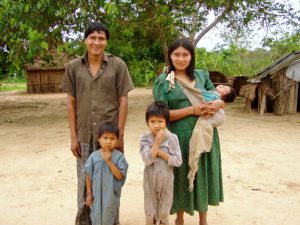You ate a big meal last night while visiting friends, and may have consumed too much alcohol. Today, you feel tired and a little light-headed. You’re also feeling nauseous, but you hope that will go away, with time. Suddenly, you break out in a cold sweat. A feeling of tightness is developing in your chest, and it’s radiating down your left arm. It’s beginning to dawn on you that you might be having a heart attack.
Heart disease is the leading cause of death for both men and women in North America and Europe, and by middle age, most people in these countries already have some signs of plaque build-up in their arteries. Even Egyptian mummies have been found to have arterial plaque in their peripheral arteries, so scientists concluded long ago that heart disease is virtually inevitable as we age. Eating well and exercising daily might delay the progression of arterial hardening, but nothing can stop the progression. Or so it was thought.
The recent discovery of an Amazonian tribe in Bolivia has revolutionized this thinking and astounded all researchers involved. A study recently published in The Lancet describes a group of Bolivian tribe people, the Tsimane, who have virtually no incidence of heart disease or stroke. They have hardly any hardening of the arteries, and few, if any, experience heart attacks or strokes even well into old age.
A full two thirds of Tsimane men over the age of 75 have almost no arterial plaque. In fact, the average 80 year old Tsimane man has the vascular age of an American man in his mid-50’s, and at middle age, they have the physiology of the average twenty year old. Hands down, the Tsimane people of Bolivia have the healthiest hearts in the world, easily knocking Japanese women out of their long-held spot in first place.
How do they achieve this remarkable feat? Researchers suspect it is a combination of diet and lifestyle factors. Since the Tsimane live without electricity or other modern conveniences, they spend most of their days on extended hunts, or gathering berries, and take an average of 17,000 steps per day. Even people over the age of 60 have a daily step count of more than 15,000. They are active for more than 90% of daylight hours, and walk about 7 1/2 miles each day. This regular physical activity is constant, but of low intensity. It’s not that they are particularly vigorous with their activity level. They just spend very little time sitting.
Their diet is surprisingly high in carbohydrates, a finding that calls into question recent evidence linking a high carbohydrate intake with increased risk of heart disease. Fully 72% of the calories in the Tsimane diet come from carbohydrates, in the form of rice, plantains, manioc, and corn. By contrast, the average western diet contains only 52% carbohydrates. The Tsimane also eat a low fat diet, with only 14% of their calories coming from fat, compared to 34% of calories in the average western diet. Protein sources take up 14% of the calories in both western and Tsimane diets, but the Tsimane consume more lean meat than we do, and less saturated fat.
Interestingly, the Tsimane people have high inflammatory markers, as they are almost constantly infected with parasites, including hookworm, roundworm, and giardia. But this near-constant state of inflammation doesn’t appear to negatively affect their arterial health, as it has been thought to do in modern societies.
Nor are the Tsimane people particularly lean. About a quarter of Tsimane adults are overweight, although none are obese. Nevertheless, their overall lifestyle keeps their LDL cholesterol, blood pressure, and blood sugar levels very low.
So, what do we do with this information? Is it the diet or the activity level of the Tsimane that’s most important? Researchers suspect that one probably feeds into the other. Perhaps the most important finding is that lifestyle has a profound influence on our heart disease risk – much more so than genetics. Cardiologists involved with the research now agree that up to 80% of premature heart disease and stroke is preventable though lifestyle changes, so the more of the Tsimane lifestyle that you can incorporate into your own, the better.
No one wants to experience the frightening symptoms of a heart attack, or stroke. These sudden events can drastically change our quality of life, and the lives of our family members, for the worse. But the Tsimane have provided us with hope. Our destiny is more firmly under our control than we may have previously thought. We just need to act on it.
About the Author: Rebecca Wong has a BA in English Literature from the University of Waterloo and has been working in the herbal business since 2000. She studied at the Ontario College of Traditional Chinese Medicine under respected authorities Paul Des Rosiers and Vu Le, and graduated from the East West School of Planetary Herbology under Michael Tierra. She received training as a yoga teacher at The Branches in Kitchener/Waterloo, and therapeutic yoga teacher training from the School for Somatic Soulwork under Deniz Aydoslu. She now teaches yoga for anxiety, depression and burnout at Rebecca's Restful Yoga Studio in Toronto.
